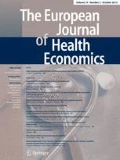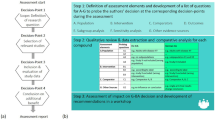Abstract
Background
Since 2011, an early benefit assessment (EBA) of new drugs constricts free price setting in Germany. According to the Pharmaceutical Market Restructuring Act (AMNOG), pharmaceutical companies are obliged to demonstrate added benefit of new drugs over comparative treatment. Benefit is usually evaluated by the Institute for Quality and Efficiency in Health Care (IQWiG). The final appraisal is made by the Federal Joint Committee, Germany’s highest-ranking decision body in the health sector, triggering drug prize negotiations between companies and statutory health insurance funds. One of four evaluation criteria is quality of life (QoL). QoL outcomes have, however, only rarely been pivotal in EBAs.
Objective
This study determined methodological requirements for QoL measurement and data presentation in the EBA.
Design
In a qualitative content analysis, documents of all EBAs completed by 2014 were searched for the term QoL. Relevant passages of all EBAs of 2011–2013 were independently extracted and reduced to key content by two researchers. Recurring patterns were identified and verified through comparison with EBAs of 2014.
Results
We identified a range of requirements regarding QoL assessment, analysis, presentation, and interpretation, which go beyond official regulations. Disease-specific questionnaires are preferred and have to be validated according to certain standards and in the respective patient group. Effects must exceed the minimal important difference, which in turn must be validated in compliance with specific requirements. Often, instruments were not accepted as QoL measures, sometimes inconsistently across EBAs. Another frequent reason for non-acceptance of QoL data was that more than 30 % of randomized patients could not be analyzed due to missing data.
Conclusions
Non-compliance with methodological requirements for QoL evidence impairs chances for positive benefit evaluation.
Similar content being viewed by others
References
Franken, M., Le Polain, M., Cleemput, I., Koopmanschap, M.: Similarities and differences between five European drug reimbursement systems. Int. J. Technol. Assess. Health Care 28(4), 349–357 (2012)
Henschke, C., Sundmacher, L., Busse, R.: Structural changes in the German pharmaceutical market: price setting mechanisms based on the early benefit evaluation. Health Policy 109(3), 263–269 (2013)
Fischer, K.E., Stargardt, T.: Early benefit assessment of pharmaceuticals in Germany: manufacturers’ expectations versus the Federal Joint Committee’s decisions. Med. Decis. Making 34(8), 1030–1047 (2014)
Hörn, H., Nink, K., McGauran, N., Wieseler, B.: Early benefit assessment of new drugs in Germany—results from 2011 to 2012. Health Policy 116(2–3), 147–153 (2014)
Leopold, C., Vogler, S., Mantel-Teeuwisse, A.K., de Joncheere, K., Leufkens, H.G.M., Laing, R.: Differences in external price referencing in Europe: a descriptive overview. Health Policy 104(1), 50–60 (2012)
Ahmed, S., Berzon, R.A., Revicki, D.A., Lenderking, W.R., Moinpour, C.M., Basch, E., Reeve, B.B., Wu, A.W.: The use of patient-reported outcomes (PRO) within comparative effectiveness research: implications for clinical practice and health care policy. Med. Care 50(12), 1060–1070 (2012)
Kreis, J., Busse, R.: From evidence assessments to coverage decisions? The case example of glinides in Germany. Health Policy 104(1), 27–31 (2012)
Institut für Qualität und Wirtschaftlichkeit im Gesundheitswesen (IQWiG): General Methods (Benefit Assessment). https://www.g-ba.de/informationen/nutzenbewertung/ (2015). Accessed 25 March 2015
Schipper, H., Clinch, J.J., Olweny, C.L.: Quality of life studies: definitions and conceptual issues. In: Spilker, B. (ed.) Quality of Life and Pharmacoeconomics in Clinical Trials, 2nd edn, pp. 15–18. Lippincott-Raven, Philadelphia (1996)
Mayring, P.: Qualitative content analysis. In: Flick, U., Kardorff, E.V., Steinke, I. (eds.) A Companion to Qualitative Research, pp. 266–269. Sage Publications, London (2004)
Meyer, T., Karbach, U., Holmberg, C., Güthlin, C., Patzelt, C., Stamer, M.: Qualitative Studien in der Versorgungsforschung—Diskussionspapier, Teil 1: gegenstandsbestimmung [Qualitative research in health services research—discussion paper, part 1: what is the idea?]. Gesundheitswesen 74(8–9), 510–515 (2012)
Gemeinsamer Bundesausschuss (G-BA): Übersicht der Wirkstoffe. https://www.g-ba.de/informationen/nutzenbewertung/ (2015). Accessed 25. March 2015
The EuroQol Group: EuroQol—a new facility for the measurement of health-related quality of life. Health Policy 16(3), 199–208 (1990)
Ware, J.E.: The SF-36 health survey. In: Spilker, B. (ed.) Quality of Life and Pharmacoeconomics in Clinical Trials, pp. S337–S346. Lippincott-Raven, Philadelphia (1996)
Aaronson, N.K., Ahmedzai, S., Bergman, B., et al.: The European organization for research and treatment of cancer QLQ-C30: a quality-of-life instrument for use in international clinical trials in oncology. J. Natl. Cancer Inst. 85(5), 365–376 (1993)
Cella, D.F., Tulsky, D.S., Gray, G., Sarafian, B., Linn, E., Bonomi, A., Silberman, M., Yellen, S.B., Winicour, P., Brannon, J., et al.: The functional assessment of cancer therapy scale: development and validation of the general measure. J. Clin. Oncol. 11(3), 570–579 (1993)
Esper, P., Mo, F., Chodak, G., Sinner, M., Cella, D., Pienta, K.J.: Measuring quality of life in men with prostate cancer using the functional assessment of cancer therapy-prostate instrument. Urology 50(6), 920–928 (1997)
McKenna, S.P., Doward, L.C., Twiss, J., et al.: International development of the patient-reported outcome indices for multiple sclerosis (PRIMUS). Value Health 13, 946–951 (2010)
Brady, M., Cella, D.F., Mo, F., Bonomi, A.E., Tulsky, D.S., Lloyd, S.R., Deasy, S., Cobleigh, M., Shiomoto, G.: Reliability and validity of the functional assessment of cancer therapy—breast quality-of-life instrument. J. Clin. Oncol. 15, 974–986 (1997)
Perleth, M., Gibis, B., Göhlen, B.: A short history of health technology assessment in Germany. Int. J. Technol. Assess. Health Care 25(1), 112–119 (2009)
Sattelmeier, J., Prenzler, A., Frank, M.: Das Arzneimittelmarktneuordnungsgesetz (AMNOG) in der Praxis—erste Erfahrungen, Kritikpunkte und Weiterentwicklungsmöglichkeiten. Gesundheitsökonomie & Qualitätsmanagement 18, 213–220 (2013)
Klose, K., Witte, J., Kreimeier, S., Greiner, W.: Lebensqualität als Wettbewerbsvorteil in der frühen Nutzenbewertung [Quality of life as advantage in competition within the early benefit assessment]. Public Health Forum 21(4), 14. e1–14. e3 (2013)
Ruof, J., Schwartz, F., Schulenburg, J.-M., Dintsios, C.-M.: Early benefit assessment (EBA) in Germany: analysing decisions 18 months after introducing the new AMNOG legislation. Eur. J. Health Econ. 15(6), 577–589 (2014)
Acknowledgments
We thank Luise Geithner, Joris Lehmann, and Nicole Wehber for their help with data collection and Mario Gehoff and Verena Heimann for assistance in manuscript preparation and submission.
Financial support
This study was financially supported by Janssen-Cilag GmbH, Neuss, Germany.
Author information
Authors and Affiliations
Corresponding author
Ethics declarations
Conflict of interest
M Augustin has served as consultant and/or paid speaker for and/or participated in clinical trials sponsored by companies that manufacture drugs including Janssen-Cilag. The Institute for Health Services Research in Dermatology and Nursing (IVDP) has received lecture and consultancy fees from Janssen-Cilag. H Metin is an employee of Janssen-Cilag. C Blome and D Lohrberg declare no conflict of interest.
Rights and permissions
About this article
Cite this article
Blome, C., Augustin, M., Metin, H. et al. Four years of early benefit assessment of new drugs in Germany: a qualitative study on methodological requirements for quality of life data. Eur J Health Econ 18, 181–193 (2017). https://doi.org/10.1007/s10198-016-0765-6
Received:
Accepted:
Published:
Issue Date:
DOI: https://doi.org/10.1007/s10198-016-0765-6
Keywords
- AMNOG
- Quality of life
- Qualitative research
- Health technology assessment
- Early benefit assessment
- Comparative effectiveness research



